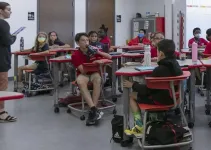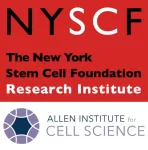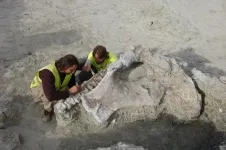Banning friendships can backfire: moms who ‘meddle’ make bad behavior worse
Study on maternal disapproval of children’s friends shows unforeseen consequences of well-intended interference
2024-09-04
(Press-News.org) Delinquent activities almost always occur outside of the home and away from adult supervision, so it is only natural for parents to blame peers for their child’s bad behavior. Not surprisingly, many parents also assume that they can prevent future problems by limiting contact with suspicious peers.
However, a new study cautions parents – especially meddling moms – to resist the temptation to prohibit friendships because doing so only makes a bad situation worse. How can this be?
Results from a new longitudinal study of middle school youth, published in The Journal of Child Psychology and Psychiatry, indicates that maternal disapproval of friends in response to child conduct problems damages the child’s standing among peers, which exacerbates the behavior problems that friend prohibition was originally intended to prevent.
Brett Laursen, Ph.D., co-author and a professor of psychology at Florida Atlantic University, in collaboration with colleagues at Mykolas Romeris University in Vilnius Lithuania, followed a community sample of 292 boys and 270 girls (ages 9 to 14) over the course of a school year. Students completed surveys at the beginning, middle and end of the year. At each time point, peer status (being liked and being disliked) and classroom disruptiveness were gauged with peer nominations. Self-reports described conduct problems and perceived maternal disapproval of friends.
Results of the study reveal that maternal efforts to intervene in problematic peer relationships by prohibiting friendships backfired. Mothers who disapproved of their children’s friends inadvertently worsened their behavior problems. Specifically, mothers who responded to behavior problems (child-reported and peer-reported) with expressions of disapproval of friends inadvertently damaged the child’s relations with peers, alienating classmates. Adjustment difficulties followed.
The study compared different forms of classmate responses to maternal friendship interference. The findings suggest that maternal disapproval of friends is more likely to elicit active disliking from classmates, rather than merely reducing the number of classmates who enjoy the child’s company.
“The findings are important because they speak to the mechanism that translates disapproval of friends into elevated behavior problems. Maternal friend disapproval has counterproductive consequences for behavior problems because of the deleterious impact it has on peer status,” said Laursen, in FAU’s Charles E. Schmidt College of Science. “Youth may report restrictions and their reasons to friends. Or mothers may express their disapproval directly to friends. Neither are likely to be welcomed by recipients. Friends may respond by spreading contempt or ridicule throughout the peer group. Social opportunities are likely to wither as peers avoid affiliating with someone who is depicted as uncool.”
The researchers suggest that another possibility is that mothers actually succeed in their efforts to disrupt a friendship.
“Imagine this scenario. A friendship ends because a mother prohibits it. Now the child needs a new friend. Who wants to be friends with someone who has an unpleasant, interfering mother? Chances are good that friend options are now quite limited and the child is forced to consider someone who also is rejected by peers; someone who has a hard time making friends,” said Laursen. “All too often, such children are disliked because they have behavior problems. At the end of the day, interference in peer relationships may force the child to befriend a poorly adjusted classmate because they have no other alternatives.”
Befriending children with behavior problems subjects them to pressure to conform to the disruptive behavior that mothers are trying to discourage. Then, too, the loss of peer status elevates the risk of behavior problems because it increases distress and challenges coping mechanisms. Finally, rejected children may be excluded from social interactions with typically developing peers, depriving them of the opportunity to develop age-appropriate social skills.
“Parents should consider positive alternatives to friend prohibition,” said Laursen. “Focus on maintaining positive relationships with children, because warmth and support can be effective buffers against troublesome peer pressure, potentially disrupting the downward spiral of peer problems and adjustment difficulties.”
The researchers also suggest that parents can create opportunities for constructive peer engagement in supervised settings and encourage participation in adult-sponsored clubs and activities, which potentially limit deviant behavior.
Study co-author is Goda Kaniušonytė, a researcher at Mykolas Romeris University.
Data collection for the research was funded by the European Regional Development Fund (project No. 09.3.3-LMT-K-712-17-0009) under a grant agreement with the Research Council of Lithuania (LMTLT), awarded to Laursen and Kaniušonytė.
- FAU -
About Florida Atlantic University:
Florida Atlantic University, established in 1961, officially opened its doors in 1964 as the fifth public university in Florida. Today, the University serves more than 30,000 undergraduate and graduate students across six campuses located along the southeast Florida coast. In recent years, the University has doubled its research expenditures and outpaced its peers in student achievement rates. Through the coexistence of access and excellence, FAU embodies an innovative model where traditional achievement gaps vanish. FAU is designated a Hispanic-serving institution, ranked as a top public university by U.S. News & World Report and a High Research Activity institution by the Carnegie Foundation for the Advancement of Teaching. For more information, visit www.fau.edu.
END
[Attachments] See images for this press release:

ELSE PRESS RELEASES FROM THIS DATE:
2024-09-04
ROCKVILLE, MD (September 4, 2024) The AIM-HI Accelerator Fund is pleased to announce that the 2024 Women’s Venture Competition’s first prize winner with distinction goes to HDAX Therapeutics led by its CEO and Co-Founder, Nabanita Nawar, Ph.D, and the Second Prize Winner goes to ARMA BIO, led by Co-Founder & CSO, Paraskevi Giannakakou, Ph.D.
The 2024 AIM-HI Women’s Venture Competition Committee reviewed more than 50 applications from 10 countries, including Canada, Ghana, India, Israel, Norway, Romania, Singapore, Spain, Thailand, ...
2024-09-04
Every day, people die waiting for an organ transplant. Time is at a premium, not just for those awaiting organs, but also for the organs themselves, which can deteriorate rapidly during transportation. Looking to extend the viability of human tissues, researchers report in ACS’ Nano Letters their efforts to facilitate completely freezing, rather than cooling and then thawing, potentially life-saving organs. They demonstrate a magnetic nanoparticle’s successful rewarming of animal tissues.
As of August 2024, more than 114,000 people are on the U.S. national transplant ...
2024-09-04
Dinosaurs continue to fascinate people, but that’s not their only enduring quality: Collagen in their skeletons remains intact for millions of years, despite containing chemical bonds that should only persist for about 500 years. Now, scientists report in ACS Central Science that the unique tenacity of this protein may result from a molecular structure that shields these vulnerable bonds from attack by water that’s present in the environment.
Collagen is the most abundant protein in animals. It’s found in skin and connective tissues, such as cartilage and bones. Fragments of collagen have been ...
2024-09-04
Rain and water in ponds and lakes slowly seeps into the soil, moving through minute cracks to refill underground aquifers. Per- and polyfluoroalkyl substances (PFAS), often described as forever chemicals, can tag along into groundwater that’s later removed for drinking. Researchers in ACS’ Environmental Science & Technology Letters analyzed water from over 100 wells in Denmark for one particularly persistent PFAS: trifluoroacetate. They report steadily increasing levels of the forever chemical in recent decades.
Trifluoroacetate forms when fluorinated gases, such as refrigerants, and fluorinated pesticides partially degrade in the environment. Water passing ...
2024-09-04
Collagen, a protein found in bones and connective tissue, has been found in dinosaur fossils as old as 195 million years. That far exceeds the normal half-life of the peptide bonds that hold proteins together, which is about 500 years.
A new study from MIT offers an explanation for how collagen can survive for so much longer than expected. The research team found that a special atomic-level interaction defends collagen from attack by water molecules. This barricade prevents water from breaking the peptide bonds through a process called hydrolysis.
“We ...
2024-09-04
Feeld, the dating app for the curious, in collaboration with Dr. Justin Lehmiller of The Kinsey Institute, has released a groundbreaking report, "The State of Dating: How Gen Z is Redefining Sexuality and Relationships." Released on World Sexual Health Day under the theme #PositiveRelationships, this report takes a deep dive into how Gen Z—shaped by global instability, digital immersion, and evolving cultural scripts—are shaping their approach to dating and sexuality.
After analyzing ...
2024-09-04
Seattle, WA and New York, NY—September 4, 2024—Today, the Allen Institute for Cell Science and New York Stem Cell Foundation (NYSCF) announced a pioneering collaboration to address this critical issue, combining two cutting-edge technologies to create more inclusive cellular models for studying disease. This partnership will introduce the Allen Institute for Cell Science’s structure tags into NYSCF’s collection of ethnically diverse stem cell lines. The result: an unprecedented resource that will enable researchers to examine disease mechanisms and potential treatments across a ...
2024-09-04
Photosynthesis can take place in nature even at extremely low light levels. This is the result of an international study that investigated the development of Arctic microalgae at the end of the polar night. The measurements were carried out as part of the MOSAiC expedition at 88° northern latitude and revealed that even this far north, microalgae can build up biomass through photosynthesis as early as the end of March. At this time, the sun is barely above the horizon, so that it is still almost completely dark in the microalgae's habitat under the snow and ice cover of the Arctic Ocean. The results of the study now published in the journal Nature Communications show that photosynthesis ...
2024-09-04
New research shows that parasitic nematodes, responsible for infecting more than a billion people globally, carry viruses that may solve the puzzle of why some cause serious diseases.
A study led by Liverpool School of Tropical Medicine (LSTM) used cutting-edge bioinformatic data mining techniques to identify 91 RNA viruses in 28 species of parasitic nematodes, representing 70% of those that infect people and animals. Often these are symptomless or not serious, but some can lead to severe, ...
2024-09-04
A new study led by Portuguese paleontologist Pedro Mocho, from the Instituto Dom Luiz of the Faculty of Sciences of the University of Lisbon (CIÊNCIAS), has just been published in the Communications Biology journal, which announces a new species of sauropod dinosaur that lived in Cuenca, Spain, 75 million years ago: Qunkasaura pintiquiniestra.
The more than 12,000 fossils collected from 2007 onwards during works to install the Madrid-Levante high-speed train (AVE) tracks revealed this deposit, giving rise to one of the most relevant collections ...
LAST 30 PRESS RELEASES:
[Press-News.org] Banning friendships can backfire: moms who ‘meddle’ make bad behavior worse
Study on maternal disapproval of children’s friends shows unforeseen consequences of well-intended interference




